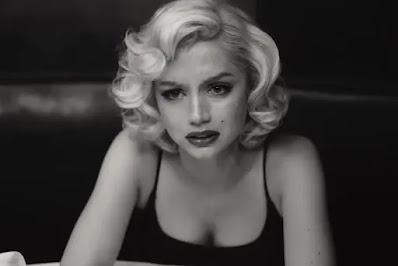 |
| Ana de Armas in Blonde |
I bring up the source novel because the criticism of this film has contained many objections that this is not a real or rounded portrait of Marylin. I would suggest that the concept of the "real" Marilyn is a slippery one. There are a multiplicity of Marilyns at this point. Ms. Joyce chose to make a poetic nightmare out of Ms. Monroe's life and Mr. Dominik's remains largely faithful to that vision. The least successful episodes in the book seem similarly silly in the film: specifically the menage a trois with the sons of Charlie Chaplin and Edward G. Robinson and Marilyn's dialogues with her aborted fetus. I also can't defend the POV shot from Marilyn's vagina of her gynecologist handling his speculum or the POV shot from JFK's pubis as Monroe fellates him; despite these adding to the element of body horror in the film. This is a portrait of a Marilyn whose corpus is not her own, but one claimed by the howling male yahoos of the American body politic.
Bad taste is timeless. What seemed tawdry in Ms. Oates book twenty years ago when I read it, remains so today in this film. I thought that it was not one of Ms. Oates' better books at the time, but that it was better than Mailer's joke of a book on the subject. One element Dominik tweaked and improved upon was making Marilyn's demise more ambiguous. In the book, an assassin sent by JFK offs her. In the film, the surveillance of Marilyn by unseen forces is made plain and spooky agents and specters stalk her house as she slips her mortal coil, but there is no direct cause and effect. Both book and film hammer home too bluntly the theme of Marilyn's loss of identity. Ana de Armas even has to baldly voice the notion that she realizes Marilyn is a construct and that Norma Jean is to be forever traumatized by the memory of her mad mother and absent father.
Such dubious dialogue puts too much weight on Ms. Armas' bony shoulders. She is a promising actress, but is overmatched here. She captures superficial aspects of Marilyn, the breathy voice for instance, but lacks her volcanic power. A beautiful woman, Armas doesn't have the overwhelming voluptuousness of Monroe and her, onscreen, aura of fun and sport. There are some good performances in the film, most especially Julianne Nicholson and Adrian Brody. Brody is an ideal match for that fellow Gotham native, Arthur Miller.
What else did I like about the film? Mostly the choices Dominik made regarding the film's technical and formal aspects. Dominik and his associates spent a lot of researching the look of Marilyn's various films, film sets, press shoots press conferences, nudie photos, and advertisements. Whether black or white or color, the recreations in the film are an amazing match to the tones and shades of the originals. I thought they reinforced the film's theme of "Marilyn" being a media construct totally divorced from Norma Jean. I feel Blonde succeeds visually even when its sordid and haphazard narrative fails.
Dominik is among the most misanthropic of today's directors. I am not sure he was the best choice to direct this project. The result reminds me of an Otto Preminger musical. He seems more attuned to the dog eat machinations of males in his two Brad Pitt films and Chopper. I am not sure if Dominik can make an entirely successful film with a female protagonist. He seems more interested in the big bad wolves of life than in the red riding hoods. Blonde is his least successful film, but, given the unpromising material on which it was based, it turned out to be better than I expected.





No comments:
Post a Comment